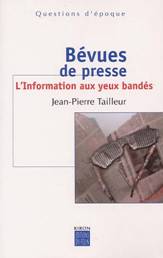|
|
Alain Minc's "Média-choc" |
|
Book review of an essay on French media
France's relative lack of credibility in the world's media does not fit with its widespread influence on Arts and Culture, from architecture to cuisine. A landmark institution like Le Monde is not respected like the Washington Post for its independence and profitability. French TV-journalists are no model for irreverence to the executive power. Alain Minc, arguably the French intellectual with higher profile in this decade, assesses this relative disaster in his last book titled with a self-explaining Le Média-choc ("The Media-shock" in English). A best selling essayist on topics so diverse as geopolitics or welfare economy, Mr.Minc quite logically plunged himself into one of the main issues nowadays: mass communication. "In a country where intellectual reflection regulates any spot of institutional activities (...), practically no scholar investigated the so-called fourth power," notes Mr. Minc. The so-so Gallic version of Alvin Toffler, who can also be compared to Apple Computer's John Sculley, since both are businessmen with strong-willed ideas, was a natural candidate for this study. Mr. Minc starts his diagnosis with a counter-example, radio, the most successful media in France ... by accident. "The French state behaved himself the American way, without controlling it," he remarks. France's radio landscape is ironically led by RTL, a "peripheral station" from Luxembourg. When the media was created 60 years ago, the French government forbade private initiatives in this field, pushing creativity and originality abroad, in the neighboring Monaco and Luxembourg. Radio is now the only media which satisfies France's desire for grandeur: Radio France International has about as many listeners as the BBC or the Voice of America, despite the domination of English language. However French newspapers and magazines do not have a readership comparable to their Anglo-Saxon counterparts'. The Wall Street Journal has the same circulation as Le Monde, in proportion to the population; but we are comparing general news with a financial newspaper! The very popular radio morning news, and above all the selling costs, account for this situation. Le Monde is three times more expensive than The New York Times. Like eggs and chickens, however, there are deeper causes for this disdain. Prevailing egoisms are obstacles to productivity efforts; they artificially increased the French press' fixed costs. The journalists' lack of facts checking, and errors recognizing, created mistrust from the public. "Journalists are a 'lumpen intelligentsia'(*) without enough background" on the fields they treat, thinks Mr. Minc. "As a group, they protect their black sheeps," instead of enhancing Anglo-Saxon objectivity and professionalism." These shortcomings are even more visible on television. "The cult of technique, the myth of culture, and the preponderance of politics" weakened it, states Mr. Minc. In hardware, French engineers failed to impose their TV-norm Secam worldwide, despite its technological superiority. In software, the French government failed to create fair competitions, and to achieve its cultural goals for programs. The first TV-channel TF1, for example, owned by a public work magnate, now draws 40 percent of the audience, and respects its cultural quotas with non-commercial programs at ... 2 a.m. The media landscape Mr. Minc describes may not be as negative as he describes it. He neglects to mention that a paper like Le Monde, of which he is an administrator (!), is still considered as a reference worldwide for his broad coverage of international news, and for its deep analysis. He ignores the positive achievements of the French television: the programing of cultural debates on semi-prime time, at 9.30 p.m., proceeds from the French mentality as well as the egoism he criticizes. Mr. Minc overall shows some brightness in the diagnosis, interrelating all the media phenomenons in a didactic way. But readers of his previous analysis on the German reunification, five years before the fall of the Berlin Wall, will be disappointed. He does not clearly reply to the "What's next" question. His proposal for "ombudsmen" in French newspapers, like in The Washington Post, is too vague. His wish for a television like the BBC is rethoric. French media will solve their problems after they learn how to tackle issues directly, not hiding from economical realities through subsidies, and not escaping professionalism through journalistic mafias. Média-choc gives much material for reflection, but the solutions are far ahead.
Byline: Jean-Pierre Tailleur, Cultural Affairs, Columbia University, April 1993.
(*) Karl Marx used the term "lumpen-proletariat". |
|
